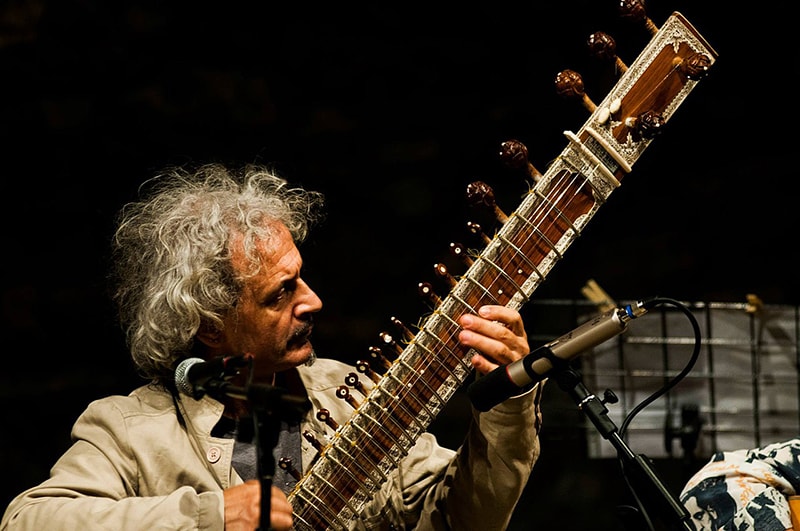
The Bhagwan hopped off the picnic table and walked around it, shaking his arms. He stepped into his Airstream and came out a few minutes later with a sitar. Before he could start to play, a student asked, “What should we do to be happy, Bhagwan?”
He raised his head, looked out at the crowd for a minute or two as if he was pondering whether or not to answer this question, then laid his sitar down and began to speak.
“There are people who are unhappy because they have a few problems,” he responded, “and there are people with many problems who are happy. There are rich people who hate their lives, and there are poor people who love their lives. Most people think that happiness is dependent on external circumstances, but that is not true.
Some people think if only they had a flashy car, a big house, and a great job, they’d be happy: that is giving too much power to external circumstances.
Other people say if only they had loving parents, a sweet girlfriend, an empathetic boss, a harmonious marriage, they’d be happy: that is giving too much power to other people.
Once our basic needs are met, happiness is not a function of our external world. If it was, we wouldn’t have so many self-destructive pop stars.
Seeking happiness through external rewards is a never-ending treadmill which makes people slaves to their desires. No matter what they have, they always long for more, believing that if they only had more, they’d be happy. That’s human nature. But happiness never comes that way.”
“Then what does it take to be happy, Bhagwan?” someone asked impatiently.
“Most of you have already been there. As children we were exuberant, playful, and full of creative imagination. But when we become adults, our inner world is dominated by the pain of the past or the fear of the future.
The irony is, the past is unchangeable no matter how much emotional currency is squandered on it. The past can be a quagmire, but it can also be a foundation for growth.
The future is uncertain no matter how much physical energy is directed towards it. The only certain thing is death, but focusing on that fear will destroy the joy of living.
Christ said, “Unless you become as little children, you will never experience the Kingdom of Heaven. What distinguishes children is that they live fully in the here and now.
They intuitively know something you don’t. All you really have is the present moment. If you waste it with thinking about memories or fears, it is lost forever. You can never recover it except in memory. Sometime memories are full of regret. How many parents have worked so hard for a better future that they didn’t have the time or energy to enjoy their toddlers? If you don’t get your priorities right early in life, you’ll spend much of your later years in regret.”
A student raised her hand. “How do we know which priorities to choose in order to avoid regrets, Bhagwan?”
“That’s a good question. I was getting to that.” He smiled, “The train to happiness has two rails. They are equally important. Those two rails are people and passion.
Everyone has a passion. Watch your children. What do they spend their time doing? If it is something creative, steer them in that direction. One boy spent much of his time at the local history museum. His father bought him a book about local history which he almost memorized. Then the father took him to other museums and the boy became fascinated with the Civil War. Now he teaches American history at a university. If you can follow your passion and make it your living, you will be halfway to a happy life.
Wealth follows passion. All of history’s super achievers were motivated by great passion. No one does anything great without passion. Conversely, people who subvert their creative passion in favor of security live lives of quiet desperation. When the time comes, you must follow your heart. It is dialed into the limitless wisdom of the universe; your mind is only dialed into your conditioning.
But you need more to be fulfilled and happy than passion. You also need a loving, complementary support group. Van Gogh had great passion, but he killed himself at the age of 37 for lack of human support. How often have you heard stories of wealthy men who died dispirited because they’d alienated the people they loved? Money may be the route to comfort, power, and prestige, but it is not the route to happiness.
Happiness is a question of balance between the energy you expend on passion, and the time you spend with people. You will be happiest if you find a satisfactory equilibrium between the two. If you manage that, you’ve chosen your priorities well.”
The group applauded.
Another student put his hand up and asked, “How do we escape our conditioning, Bhagwan?”
“Western education teaches us how to fit into the system rather than how to maximize individual potential. It assumes everyone is the same and will benefit from the same conditioning. But everyone is different and needs a different approach. The school system is not versatile enough to accommodate that. That’s why parents and relatives are so important. Only they know or care enough to meet individual needs. Parents should never let their children be steamrolled by educational authorities; they do not know better. All they know is how they’ve been programmed, which may not be right for your child.

Flavio Minardo playing the sitar. Courtesy of Wikimedia Commons/Famido.
Not only are educational authorities often at odds with parents, they teach kids that the wisdom of their elders is archaic. That’s reinforced by the way parents are portrayed on TV, often as bumbling fools – especially fathers. As a result, children do not respect their ancestors and take everything they have achieved for granted.
Once kids have learned to disregard their parents’ wisdom, they are open to indoctrination. Then the media steps in to convince them of what’s really important. If they don’t live like the fictional characters in movies and advertising, they are not really living. That causes them to become materialistic, competitive, and even violent. It starts them on a counterfeit route to happiness.
People in primitive cultures seem so much happier than those in industrialized countries because they aren’t bombarded with media propaganda. They cannot long for something of which they have no knowledge, so they appreciate what they have even though it’s not much by Western standards.
Happiness is focusing on appreciating what you have rather than on what you don’t have. You must have noticed that happy people are always expressing gratitude to everyone for everything. They live in the present knowing that their experiences are here today and gone tomorrow.
If you want to live in the present, the first thing you must do is consciously and deliberately develop an attitude of gratitude. Whenever your subconscious spews a negative thought in your face, consciously replace it with gratitude instead. For example, instead of thinking, ‘why is that guy driving a wreck like that on our public roads?’ think instead, ‘I’m grateful to have a nice vehicle.’
Learn to be grateful not only for what you have, but also for what you don’t have. As the old saying goes, I was sad because I had no shoes until I met a man who had no feet. An unfortunate medical condition, unsatisfying marriage, or a frustrating job has the potential to ruin your life. If you’re unhappy because of the things you don’t have, you’re not looking around enough.
Express gratitude to your Creator every day, not for the sake of the Creator, but for yours. If you develop an attitude of gratitude, it’ll transform your inner world and you’ll find yourself becoming more compassionate, empathetic, and joyful. You’ll treat your world differently, and that will reflect back to you in favorable ways. That is the real meaning of Karma. Happiness is not a reward for success, it engenders success. Choose to focus your attention on that part of the glass which is half-full.
Happiness is a choice, not a consequence.”
The crowd stood up this time to applaud the Bhagwan’s words. He also stood up and bowed. They all bowed back.
The contrarian stood up also and objected, “While I appreciate the sentiments, Bhagwan, you’ve said nothing that we haven’t heard in many fables and pop songs.”
“How long ago have you heard these fables and pop songs?”
“Since I was a child.”
“Are you happy?”
“Not particularly.”
“It is one thing to know the rules of chess, it’s another to master it. That can’t be done through pop songs and fables, it’s done through practice. I have given you some basic techniques needed to modify your inner world and open your heart to happiness. Don’t allow your mind to reject them without experimentation – don’t be a slave to your conditioning.”
Then the Bhagwan reached around for his sitar and started playing.
Header image courtesy of Wikimedia Commons/Radhika Lai.



